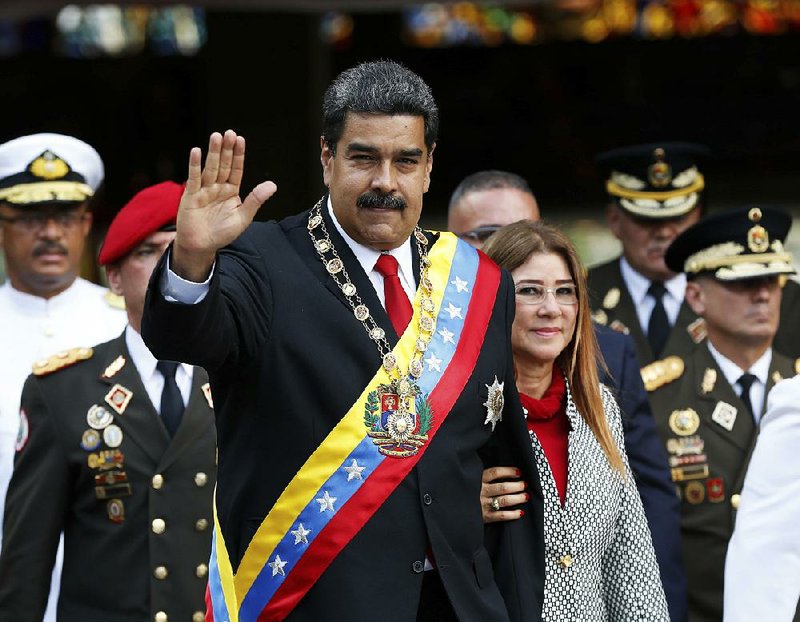BOGOTA, Colombia -- As President Nicolas Maduro has pushed forward with his plan to rescue Venezuela's cratering economy, U.S. prosecutors are looking into whether members of his family were simultaneously benefiting from what they contend was a scheme to siphon off $1.2 billion from the state-owned oil company, two people familiar with the U.S. investigation said.
The investigation, which gained momentum this week with a key guilty plea in Miami federal court, is part of a vast, multiyear effort by U.S. prosecutors to close the net on Maduro, who has largely dodged the allegations of corruption that have resulted in charges against several senior officials.
In court documents filed Wednesday, a Swiss banker named Matthias Krull admitted that he plotted with men identified only as "Los Chamos" -- Venezuelan slang for "the kids" -- to launder a $200 million slice of stolen funds from the oil company PDVSA.
Los Chamos actually are Yoswal, Yosser and Walter Flores, the children of first lady Cilia Flores from a previous relationship and thus Maduro's stepsons, according to the two Americans who discussed the case with The Associated Press. They spoke on the condition of anonymity because of the sensitive nature of the allegations.
In a criminal complaint unsealed last month and as part of a factual statement filed with Krull's plea agreement, he and prosecutors refer to them as the "stepsons" of "Venezuelan Official 2," who the two Americans said is Maduro.
Maduro, his wife and her sons were not named in the complaint. But both sources said prosecutors are looking for any links between the first couple and what they believe is a network that funneled hundreds of millions from Venezuela's oil wealth into south Florida luxury real estate at a time of widespread shortages and hyperinflation in the South American nation.
Several of those assets already are being targeted for seizure, as well as about $45 million at City National Bank of New Jersey and accounts in the Bahamas, the United Kingdom and Switzerland.
Information Minister Jorge Rodriguez, one of Maduro's closest aides, did not return repeated messages seeking comment.
No contact information was available for Maduro's stepsons, so they could not be reached for comment.
In daily, hourslong appearances on state TV, Maduro has cultivated an image of himself as a plain-speaking everyman motivated more by ideology than personal gain. But that reputation began to change when two of his wife's nephews were convicted in New York in 2016 of conspiring to smuggle cocaine, exposing his little-known family life to the scrutiny of U.S. investigators for the first time.
A Homeland Security investigator said in last month's criminal affidavit that the conspirators ginned up a currency-exchange scheme using fake loan agreements with the oil giant designed to embezzle about $1.2 billion at a time of collapsing production levels.
At the center of the scheme, prosecutors contend, was Krull, a German national with roots in Venezuela. He was arrested in July at Miami's airport on a criminal complaint naming him and seven other defendants, as well as nine unnamed conspirators, some of them former PDVSA officials. Krull later agreed to cooperate with prosecutors and was charged with a single count of conspiracy to commit money-laundering, for which he faces up to 10 years in prison.
According to court records, prosecutors arrested Krull on the basis of information from a confidential source who reached out in 2014 offering to surrender his take from the money-laundering scheme. Over the next two years, the unnamed individual secretly recorded some 100 conversations with several conspirators, including Krull, who until June worked in Panama for Zurich-based private bank Julius Baer.
Krull is described in the criminal complaint as a "high-level" banker who managed the wealth of several Venezuelan officials and "kleptocrats." He also was referred to as the "personal banker" for "Conspirator 7," who is described as the owner of a Venezuelan TV network and billionaire member of the so-called "boliburgues" who made fortunes under the Bolivarian revolution started by the late Hugo Chavez.
The two people familiar with the case said Conspirator 7 is Raul Gorrin, who became president of Globovision shortly after he and others in 2013 purchased the popular network and softened its anti-government news coverage. Gorrin's Miami lawyer did not return an email and attempts to contact him at Globovision were unsuccessful.
In his plea deal signed Wednesday, Krull said that Conspirator 7 asked him in 2016 to help launder $600 million from fraudulent business transactions with PDVSA. Later, he appealed to him for an "urgent solution" to move an additional $200 million held in a European bank on behalf of other unnamed individuals. Krull said he joined the conspiracy after being introduced directly to Los Chamos at the offices of Conspirator 7.
Krull said in the plea deal that it was explained to him how Los Chamos helped Conspirator 7 "solve issues with Venezuelan Official 2 by intervening with their mother, the wife of Venezuelan Official 2."
Krull's lawyer had no comment. Prosecutors in Miami did not return a phone call seeking comment. Julius Baer, which was not named in the U.S. complaint, said it fully cooperates with authorities but that it could not comment on potential client relationships.
A Section on 08/25/2018

